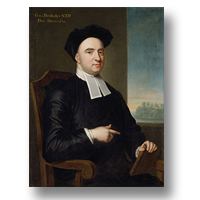|
|
|
1.
|
Berkeley Studies:
Volume >
24
Matthew Holtzman
Berkeley’s Theory of Common Sense
abstract |
view |
rights & permissions
| cited by
This essay situates Berkeley’s views on common sense within the context of eighteenth-century debates about the nature of common sense. It argues that in his Notebooks, Berkeley develops a theory according to which to possess common sense is to use the faculties of the mind properly, and that Berkeley’s approach to common sense can be understood as a response to John Toland’s epistemology of religion. It concludes with a discussion of consequences of this analysis for our understanding of Berkeley’s later works, his methods, and his overarching philosophical aims.
|
|
|
|
|
authors reply to critics: |
|
2.
|
Berkeley Studies:
Volume >
24
John Russel Roberts
Berkeley’s Mental Realism:
A Reply to My Critics
abstract |
view |
rights & permissions
| cited by
This essay summarizes the argument of my A Metaphysics for the Mob: The Philosophy of George Berkeley, and it provides replies to objections raised against it, particularly about my focus on Berkeley's view of the nature of spirits. Specifically, I address worries about identifying mind as will, how we can think of God, the relation of mind and ideas, and how thinking of Berkeley’s efforts as metaphysical is compatible with his commitment to common sense.
|
|
|
|
|
3.
|
Berkeley Studies:
Volume >
24
Marc A. Hight
The Importance of Idea Ontology:
A Reply to My Critics
abstract |
view |
rights & permissions
| cited by
In my book Idea and Ontology I argue for a re-evaluation of how we read and engage early modern philosophy with respect to the so-called way of ideas. I contend that, despite current trends that emphasize epistemology as first philosophy, we need to retain the importance of ontology when interpreting and learning from the early moderns. In this piece, I respond to critical reviews of my book, deepening the discussion of several topics. The main topics include whether ideas are private to the finite minds that perceive them in Berkeley’s philosophy, the nature of modes in typical early modern ontologies, and issues regarding the charitable reading of other scholars.
|
|
|
|
|
4.
|
Berkeley Studies:
Volume >
24
Stephen H. Daniel
How Berkeley Redefines Substance:
A Reply to My Critics
abstract |
view |
rights & permissions
| cited by
In several essays I have argued that Berkeley maintains the same basic notion of spiritual substance throughout his life. Because that notion is not the traditional (Aristotelian, Cartesian, or Lockean) doctrine of substance, critics (e.g., John Roberts, Tom Stoneham, Talia Mae Bettcher, Margaret Atherton, Walter Ott, Marc Hight) claim that on my reading Berkeley either endorses a Humean notion of substance or has no recognizable theory of substance at all. In this essay I point out how my interpretation does not assume that Berkeley adopts a bundle theory of mind, but instead redefines what it means for a simple substance to be the principle by which ideas are perceived.
|
|
|
|
|
5.
|
Berkeley Studies:
Volume >
24
Keota Fields
Berkeley’s Metaphysics of Perception:
A Reply to My Critics
abstract |
view |
rights & permissions
| cited by
In this reply, I use an act theory to explain divine ideas and Berkeley’s archetype–ectype distinction. I argue that divine ideas are acts of divine self-consciousness in reply to the objection that if divine ideas are acts, then for Berkeley they are acts without objects. The result is a much more plausible account of Berkeley’s archetype–ectype distinction than is available on representationalist interpretations. Lastly, while arguments from illusion are indispensable to representationalist theories, Berkeley’s rejection of arguments from illusion is evidence that he endorsed an act theory of ideas.
|
|
|
|
|
6.
|
Berkeley Studies:
Volume >
24
Scott C. Breuninger
Berkeley and the Irish Enlightenment: How ‘Irish’ Are ‘We Irish’:
A Reply to My Critics
abstract |
view |
rights & permissions
| cited by
The contemporary view of scholars that Berkeley’s legacy stems from his philosophical work has traditionally dominated discussions of his significance, despite the prolific nature of his writings. This disjunction between his reputation and historical interests can be addressed by locating Berkeley’s career within his Irish context(s) and examining those aspects of his career that have often been disregarded as immaterial to his philosophical projects. When seen from this perspective, the trajectory of Berkeley’s intellectual pursuits mirrored those of the broader Irish Enlightenment and represents an important contribution to this emerging field.
|
|
|
|
|
7.
|
Berkeley Studies:
Volume >
24
Georges Dicker
Berkeley’s Idealism:
A Reply to My Critics
abstract |
view |
rights & permissions
| cited by
This essay replies to criticisms of my Berkeley’s Idealism: A Critical Examination made by Margaret Atherton and Samuel Rickless. These critics both focus primarily on my treatment of Berkeley’s arguments in the opening sections of Principles Part I and the first of his Three Dialogues. They mainly agree that the arguments I attribute to Berkeley are unsound for the reasons that I give, but also argue that I misrepresent his arguments and that his real arguments are better. Here I defend both my interpretations and my assessments of Berkeley’s arguments.
|
|
|
|
|
|
|
8.
|
Berkeley Studies:
Volume >
24
Tom Jones
Review: Marc A. Hight, ed. The Correspondence of George Berkeley
view |
rights & permissions
| cited by
|
|
|
|
|
|
|
9.
|
Berkeley Studies:
Volume >
24
News and Announcements
view |
rights & permissions
| cited by
|
|
|
|
|
|
|
10.
|
Berkeley Studies:
Volume >
24
Recent Works on Berkeley (2011 – 2013)
view |
rights & permissions
| cited by
|
|
|
|
